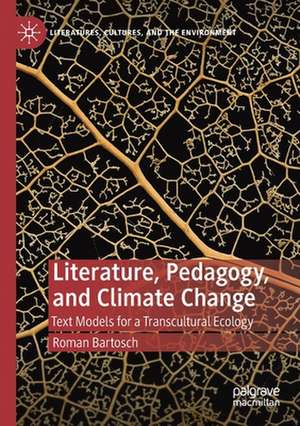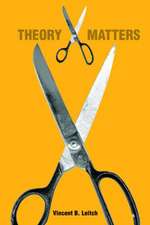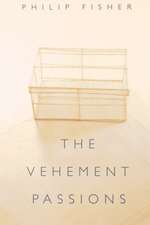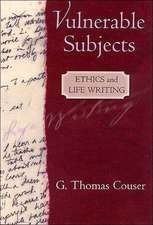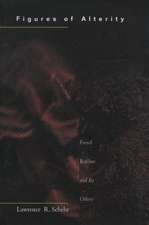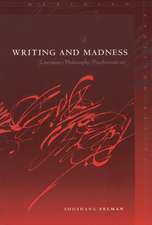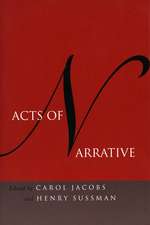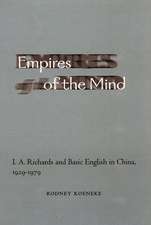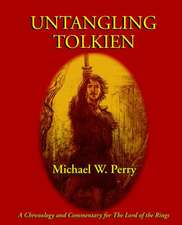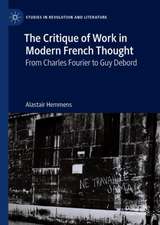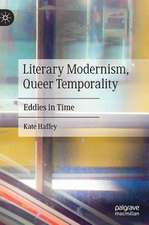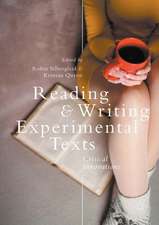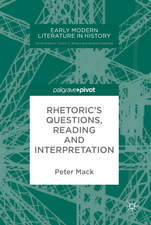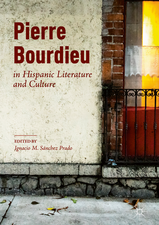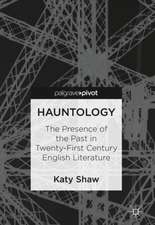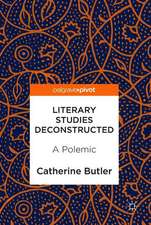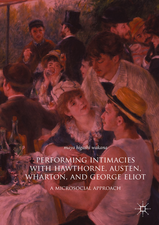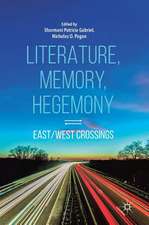Literature, Pedagogy, and Climate Change: Text Models for a Transcultural Ecology: Literatures, Cultures, and the Environment
Autor Roman Bartoschen Limba Engleză Paperback – 16 dec 2020
| Toate formatele și edițiile | Preț | Express |
|---|---|---|
| Paperback (1) | 521.60 lei 6-8 săpt. | |
| Springer International Publishing – 16 dec 2020 | 521.60 lei 6-8 săpt. | |
| Hardback (1) | 526.18 lei 6-8 săpt. | |
| Springer International Publishing – 16 dec 2019 | 526.18 lei 6-8 săpt. |
Din seria Literatures, Cultures, and the Environment
- 18%
 Preț: 624.51 lei
Preț: 624.51 lei - 20%
 Preț: 692.35 lei
Preț: 692.35 lei -
 Preț: 388.72 lei
Preț: 388.72 lei -
 Preț: 386.81 lei
Preț: 386.81 lei - 15%
 Preț: 582.95 lei
Preț: 582.95 lei - 18%
 Preț: 727.97 lei
Preț: 727.97 lei -
 Preț: 385.84 lei
Preț: 385.84 lei - 15%
 Preț: 705.18 lei
Preț: 705.18 lei -
 Preț: 417.30 lei
Preț: 417.30 lei - 18%
 Preț: 950.21 lei
Preț: 950.21 lei -
 Preț: 389.88 lei
Preț: 389.88 lei - 15%
 Preț: 584.58 lei
Preț: 584.58 lei - 15%
 Preț: 523.22 lei
Preț: 523.22 lei - 15%
 Preț: 581.47 lei
Preț: 581.47 lei - 15%
 Preț: 693.25 lei
Preț: 693.25 lei - 18%
 Preț: 887.24 lei
Preț: 887.24 lei - 15%
 Preț: 700.75 lei
Preț: 700.75 lei - 15%
 Preț: 641.71 lei
Preț: 641.71 lei - 18%
 Preț: 786.66 lei
Preț: 786.66 lei - 18%
 Preț: 783.81 lei
Preț: 783.81 lei - 18%
 Preț: 787.15 lei
Preț: 787.15 lei - 18%
 Preț: 950.33 lei
Preț: 950.33 lei -
 Preț: 391.61 lei
Preț: 391.61 lei - 15%
 Preț: 583.13 lei
Preț: 583.13 lei - 18%
 Preț: 1001.32 lei
Preț: 1001.32 lei
Preț: 521.60 lei
Preț vechi: 613.64 lei
-15% Nou
Puncte Express: 782
Preț estimativ în valută:
99.83€ • 103.94$ • 84.36£
99.83€ • 103.94$ • 84.36£
Carte tipărită la comandă
Livrare economică 11-25 martie
Preluare comenzi: 021 569.72.76
Specificații
ISBN-13: 9783030333027
ISBN-10: 3030333027
Pagini: 178
Ilustrații: IX, 178 p. 4 illus.
Dimensiuni: 148 x 210 mm
Greutate: 0.25 kg
Ediția:1st ed. 2019
Editura: Springer International Publishing
Colecția Palgrave Macmillan
Seria Literatures, Cultures, and the Environment
Locul publicării:Cham, Switzerland
ISBN-10: 3030333027
Pagini: 178
Ilustrații: IX, 178 p. 4 illus.
Dimensiuni: 148 x 210 mm
Greutate: 0.25 kg
Ediția:1st ed. 2019
Editura: Springer International Publishing
Colecția Palgrave Macmillan
Seria Literatures, Cultures, and the Environment
Locul publicării:Cham, Switzerland
Cuprins
1. Anthropocene F(r)ictions: Transcultural Ecology and the Scaling of Perspectives.- 2. Towards Transcultural Competence: Scaling | World | Literature.- 3. Affirmative Paradiscourse and the Petroleum Unconscious: The Share of the Reader in the Energy of Stories.- 4. Doubling the World: Dark Cosmopolitanism and the Creative Potentials of Autrediegesis.- 5. Beyond Declension: Numinous Materialities and Transformative Education.- 6. Framing Framing: Aliens, Animals, and Anthropological Différance across Media.- 7. Scaling Transcultural Ecology: Balance on the Edge of Extinction.
Notă biografică
Roman Bartosch is Associate Professor of Anglophone Literatures and Cultures and the Teaching of English at the University of Cologne, Germany, and coeditor of Beyond the Human-Animal Divide (Palgrave 2018).
Textul de pe ultima copertă
Literature, Pedagogy, and Climate Change: Text Models for a Transcultural Ecology asks two questions: How do we read (in) the Anthropocene? And what can reading teach us? To answer these questions, the book develops a concept of transcultural ecology that understands fiction and interpretation as text models that help address the various and incommensurable scales inherent to climate change. Focussing on text composition, reception, storyworlds, and narrative framing in world literature and elsewhere, each chapter elaborates on central educational objectives through the close reading of texts by Chimamanda Ngozi Adichie, Teju Cole and J.M. Coetzee as well as films, picture books and new digital media and their aesthetic affordances. At the end of each chapter, these objectives are summarised in sections on the ‘general implications for studying and teaching’ (GIST) and together offer a new concept of transcultural competence in conversation with current debates in literaturepedagogy and educational philosophy.
Caracteristici
Provides applications for study and teaching the environmental humanities Discusses environmental change and the political, philosophical, and educational implications of Anthropocene discourse Draws on texts by McEwan, Adichie, and Coetzee, among others, to model how topics of scale, human-animal relationships, carbon emissions, and more can be understood through fiction
